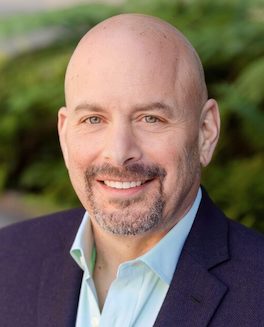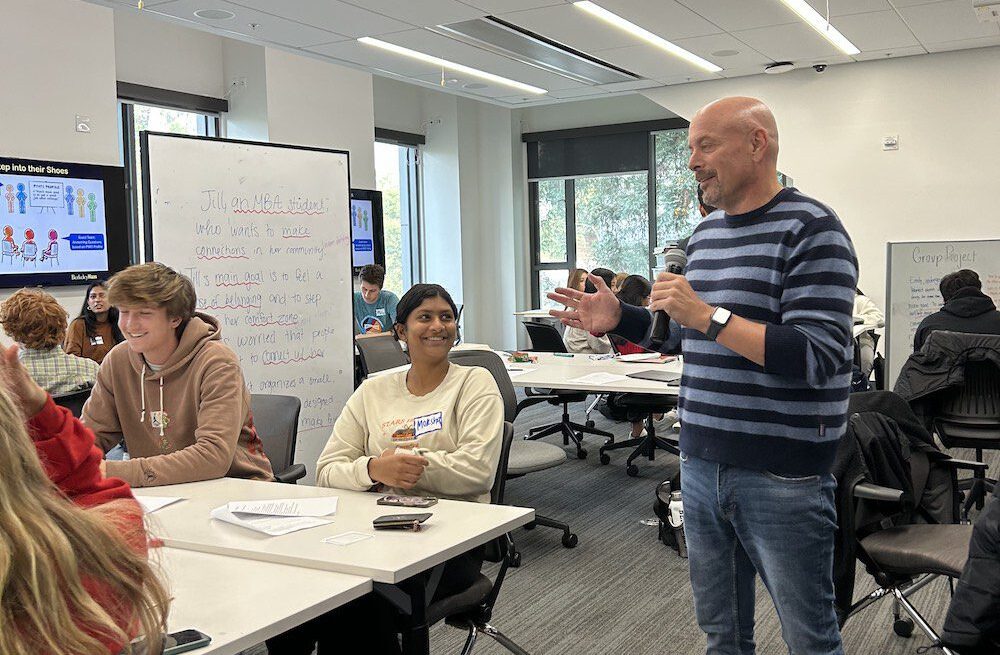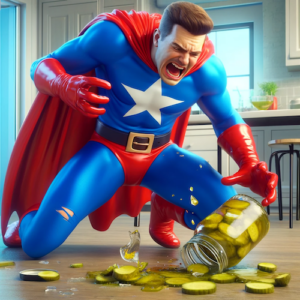Haas Voices is a first-person series that highlights the lived experiences of members of the Berkeley Haas community.
 Doug Leeds, BA 92 (political economy), is a lawyer turned serial tech executive who formerly worked at Yahoo! and as CEO of Dictionary.com and Ask.com. Diagnosed with ADHD earlier this year, Leeds discusses how that diagnosis changed his life and his work as a teacher—and is driving his plan to launch a support group for Haas community members with ADHD.
Doug Leeds, BA 92 (political economy), is a lawyer turned serial tech executive who formerly worked at Yahoo! and as CEO of Dictionary.com and Ask.com. Diagnosed with ADHD earlier this year, Leeds discusses how that diagnosis changed his life and his work as a teacher—and is driving his plan to launch a support group for Haas community members with ADHD.
Leeds, a professional faculty member, teaches the undergraduate classes Creativity in Leadership and Leadership by Persuasion.
“I went to Berkeley undergrad on the six-year plan. I made the five-year people look good. Now, I can look back and say that there was a lot of ADHD going on with me and that was why it took me six years to understand how to study.
Even before coming to college, I was a ‘good-bad student’ who did well on tests but couldn’t handle sitting in classes. I remember skipping most of my classes at Berkeley. I just learned in different ways.
What is clear to me now is that my entire family has ADHD. My dad, my mom, my brother, and, as it turns out, all of my closest friends. But none of them knew that until I got diagnosed in January—and I started thinking that my diagnosis also applied to people I know.
In many ways, I was lucky growing up because I didn’t feel different. I was surrounded by people who had ADHD, too.
The things that made me struggle were the things that made my mom and dad struggle. And they told me how to deal with it. It was never my fault. I just had to learn in a different way.
When I was in seventh grade, my parents went to back-to-school night and met my math teacher. We were six weeks into school. He looked up my name and said, ‘He’s missing 45 homework assignments.’
This is how lucky I am: My parents blamed the school for not calling them. So, the next year, I went to a different school, which provided a different way of learning. We had small classes, and you knew your teachers. I did much better in those types of classes and was able to get to Berkeley.
At Berkeley, it all started again. I almost never went to class, and I almost failed out. Then, two things happened. A Letters & Science advisor saved my life by allowing me to drop all of my classes when I was expecting to get all Fs so I could start over. He advised me to enroll in classes again and focus not on perfectionism and getting As but on just getting Bs.
Then I met my girlfriend, who is now my wife. She told me if you want to hang out with me, I’m going to be at the library, and I’m going to be in class. I still didn’t go to class as much. But I went to the library to study with her. Later, I learned about a thing called ‘body doubling,’ which is having to be around other people to get stuff done as a person with ADHD.
My wife helped me do well in school, and I helped her, too. Then, I went to law school—not because I knew what I wanted to do, but because my dad went and said I’d like it. And I did. You study in study groups, which was perfect for me. I rarely went to class, but I didn’t need to because everyone who went to class would hang out and talk about class.
I started to practice antitrust law, but litigation wasn’t right for me because it’s not collaborative. But I got very lucky again. I had my second child and came back to work after a week of paternity leave, and the partner who was my boss got mad at me because my billable hours were down. He asked me to make a choice: Are you going to be a family man or a firm man? I said, ‘Thank you, goodbye. I’m going to be a family person.’ So leaving law was for my family, but I found life as a business executive much more interesting and fulfilling, because we worked in teams, solving tough problems. It was in business roles that I really found my groove.

Leeds says he designed his Creativity and Leadership class to be a class that he would want to attend.
In my Creativity and Leadership class I’ve used what I now know about ADHD to help create a course that I would have wanted to attend. We play a lot of games; we’re moving around; I’m out of my seat; and we’re learning. I’m having fun. I teach, but I also learn from who I’m teaching. The class capstone project is a social action project. So the students will go out into the community and try to make some positive change. I was interested in teaching leadership by actually having people practice it—not just talk about it. So I now ask what tools I can give them. And one of them is: How do you persuade people when you don’t have status? When you don’t have status, you’re not in control, but you can motivate people to your way of thinking, which is a definition of leadership.
In my Creativity and Leadership class I’ve used what I now know about ADHD to help create a course that I would have wanted to attend.
I’ve been open about my diagnosis with my students. I try not to be a diagnostician because I’m not qualified to do that. But I’ve had a bunch of students come up to me because I’m transparent, and they say, ‘I have it, too.’ In class, I emphasize skills like collaboration, active listening, and empathy that are particularly resonant for people with ADHD but are also useful for everybody. I’ve also discovered some really helpful tools, like a website called Focusmate, a wonderful tool for body doubling. You set up a free Zoom call with somebody, and you say, ‘Hey, I’m working on this. And they say, ‘Hey, I’m working on this,’ and you both work on your project separately but together, and it helps you get stuff done.

Superman breaking a pickle jar. Courtesy of Doug Leeds
After informally meeting people on campus with ADHD, I approached Don Capone, a psychologist with Mental Health and Wellbeing at Haas, and said I wanted to create a group where people can exchange information, tell their stories, and get access to what’s worked on campus for them.
What I’d really like to do is meet people on the faculty and staff and just get a conversation going. ADHD can be a struggle. But it can also be really empowering when you know how it works. Those of us with ADHD are on a journey together. I want to share the travel stories.
I now genuinely think of ADHD as my superpower. But I’m Superman holding a pickle jar.
I have super strength, but sometimes, I forget I’m different, and when I try to do seemingly simple things, like opening a jar of pickles, I forget my superpower and break off the lid. Then it can get messy and bad things can happen. I can get frustrated, or splash the people around me in smelly pickle juice. But if I remember who I am, my strengths and my limitations, I can not only avoid the mess, but really use my ‘powers’ to do some good in the world. That’s incredibly motivating to me.”
Posted in: